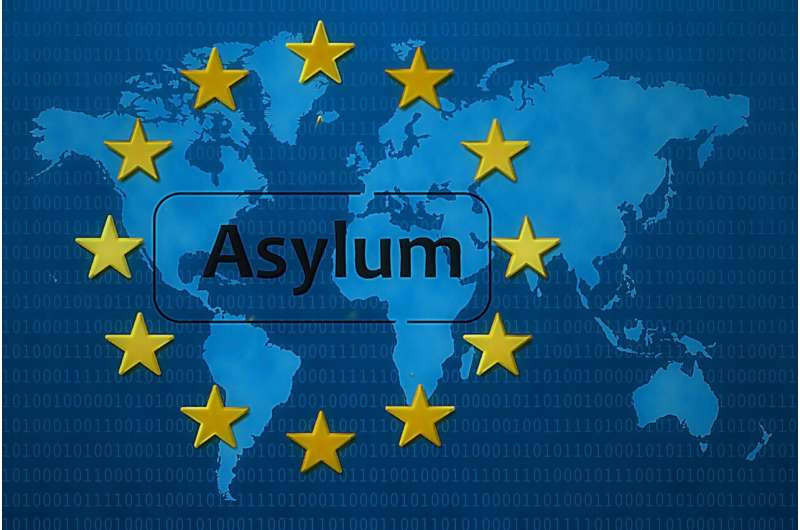Credit: Pixabay/CC0 Public Domain
The first lockdown to curb the spread of COVID-19 had a significant detrimental impact on refugees and asylum seekers, researchers at Newcastle University say.
The requirement to stay at home meant that most were not able to access the physical premises of support groups that provide refugees and asylum seekers with opportunities to access information, support, and education. This meant that many experienced greater feelings of isolation and loneliness. This was particularly the case for single mothers with very young children and single men who had been trying to claim asylum for several years, who were already alone and less likely to have support networks.
Although the response of the sector was positive, moving quickly and effectively to make services available online, digital inequality and insufficient access to smartphones, computers, or televisions meant that many refugees and asylum seekers could not access the online spaces that became important for connectivity and wellbeing during the pandemic. This wasn't just as a result of their limited income but was made worse by the restrictions imposed on refugees and asylum seekers by Home Office requirements that prevent them getting broadband services or access to bank accounts.
The research has been published in a new report, "It's like rubbing salt on the wound: the impacts of COVID-19 and lockdown on asylum seekers and refugees."
Challenges and inequalities
Dr. Robin Finlay, co-author of the report, and a Research Associate in Newcastle University's School of Geography, Politics and Sociology, said: "For asylum seekers and refugees, the impacts of COVID-19 overlap with a range of challenges and inequalities that pre-date the pandemic. Many of the refugees and asylum seekers we spoke to said that their lives were already in a state of lockdown before the pandemic as they faced restrictions in several areas such as housing, education, finance and employment. What the research shows is the pandemic has intensified the hostility of the already hostile environment."
Peter Hopkins, Professor of Social Geography and co-author of the report, noted: "The closure of community spaces, which provide asylum seekers and refugees with a crucial way to develop a sense of local inclusion as well as being important for wellbeing, exacerbated the already high rates of social isolation and poor mental health experienced by this group."
The research team interviewed 50 refugee and asylum seekers in Glasgow, Newcastle and Gateshead, aged between 19 and 50 and from a range of countries and regions, including Sudan, Nigeria, Syria, and Iraq.
A female asylum seeker from the Middle East said: "Before COVID, I used to attend community groups, especially the Kurdish Women's Group. Coming to the UK I felt really alone and depressed because I felt isolated. But that group was open, and I could meet my fellow people—the people who spoke my language—and my mind was kind of away from all the stuff that I had left back home. But now, I don't have this and it's dragging me down even more. I used to go there a lot, we used to do activities and talk about mental health, English classes, but now I am just home alone. It's really hard."
Chronic lack of funding
The researchers also talked to 20 organizations who support refugees and asylum seekers and carried out a nationwide survey of almost 100 service providers ranging from small organizations with a handful of staff to larger agencies with offices across the UK.
Many organizations said they had to cancel in-person provision and move services online so that they could continue to offer support. As a result of the restricted opportunities for asylum seekers and refugees to find work, many play crucial roles in volunteering with service providers, and several organizations the researchers talked to are led by refugees or have staff in key roles who have a refugee background. More than two thirds (67 percent) of the service providers interviewed said their volunteers played a key role in their response to the pandemic.
Some organizations talked about how they had introduced weekly doorstep visits, including grocery deliveries, as a way to maintain contact with refugees and asylum seekers, while others said they provided devices and internet data as well as clothes, furniture and books as a way of keeping in touch.
Despite this, less than half (39 percent) were confident that their organization had the right resources to support them during the pandemic—an indication of the chronic lack of funding facing the sector, the research team say. Overall, service providers said they had found new ways of working because of the pandemic, with 60 percent saying that they had made longer term changes for the better as a result.
"Those providing services for refugees and asylum seekers responded to the pandemic in a positive and flexible manner and stepped in to ensure they provided critical services as well as supporting the wellbeing of their staff and volunteers, highlighting the incredible commitment and dedication of their staff," said Dr. Matthew Benwell, co-author of the report and Senior Lecturer in Human Geography. "However, this was in the face of already limited resources, and we found that the vast majority of organizations were very concerned about the ongoing impact of the pandemic and lack of government support for asylum seekers and refugees."
More information: It's like rubbing salt on the wound: The impacts of COVID-19 and lockdown on asylum seekers and refugees. eprints.ncl.ac.uk/file_store/p … 45B-1EC82308EA7E.pdf
Provided by Newcastle University






















